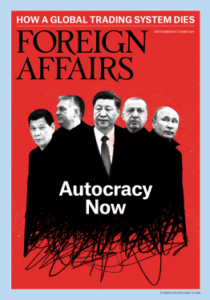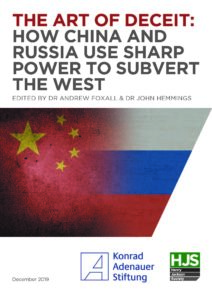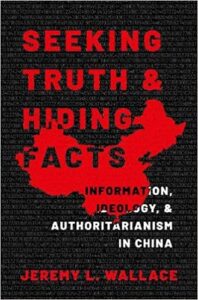This week, Chinese President Xi Jinping is visiting Russian President Vladimir Putin for the first time since the latter invaded Ukraine last year, Vox reports. The two countries also remain bonded by similarities in their authoritarian approach to governance as well as a shared goal of preventing the expansion of US power.
The alignment of authoritarian leaders may see the world divided into opposing camps for decades, stymieing cooperation on climate change, choking global action on human rights abuses, paralyzing international institutions and increasing tensions in contested regions, The Post’s Robyn Dixon reports:
But while Putin is searching for allies who can send weapons, boost trade or at least support him in global forums, for Xi, the visit seems more about positioning Beijing globally than about Russia or Ukraine, said Aleksei Chigadayev, a China analyst at Leipzig University and former lecturer at Moscow’s Higher School of Economics who left Russia because of the invasion.
 “It’s a demonstration to the world, ‘We can mediate in international conflicts, and we are a reliable partner,’” he said of Xi’s visit.
“It’s a demonstration to the world, ‘We can mediate in international conflicts, and we are a reliable partner,’” he said of Xi’s visit.
The limits of the two states’ “No Limits” relationship are increasingly on display, says a leading analyst.
Xi must work out how to be a credible broker of an Ukraine-Russian peace deal, while remaining a close friend of Putin’s. This looks almost impossible, notes Edward Lucas. Apart its recent Saudi-Iranian deal, China has struggled in multilateral diplomacy (notably regarding next-door North Korea). In Ukraine, it starts from scratch, or worse, he writes for the Center for European Policy Analysis:
A phone call from Xi to President Volodymyr Zelenskyy will be the belated start of Chinese engagement but no basis for intervention. Ukraine is in no mood to compromise: Russia’s offensive has stalled, Western arms are arriving and a counter-attack is looming. Xi’s only real leverage is to threaten to provide more substantial military help for Russia. But that risks further angering the United States. Unless he seeks a showdown with the West right now, this option looks highly unattractive.
Over the past 20 years Alexei Venediktov, the founder of Ekho Moskvy, an independent radio station recently closed by the Russian authorities, has conducted an informal but informative survey, The Economist adds:
 Every time he saw Mr Putin, or one of his security advisers, he would name three threats—China, Islamic terrorism and NATO —and ask them to rank them. In Mr Putin’s first two presidential terms from 2000 to 2008, Islamic terrorism came at the top, followed by China then NATO. After 2008, the order changed: China was seen as the biggest threat, followed by NATO then Islamic terrorism. After Russia’s annexation of Crimea and pivot towards China, the order changed again: NATO, then Islamic terrorism, then China.
Every time he saw Mr Putin, or one of his security advisers, he would name three threats—China, Islamic terrorism and NATO —and ask them to rank them. In Mr Putin’s first two presidential terms from 2000 to 2008, Islamic terrorism came at the top, followed by China then NATO. After 2008, the order changed: China was seen as the biggest threat, followed by NATO then Islamic terrorism. After Russia’s annexation of Crimea and pivot towards China, the order changed again: NATO, then Islamic terrorism, then China.
For Mr Putin, the invasion of Ukraine is not just a bid to regain historic Russian territory, it adds. It is a war on the West, and China is the most powerful partner that Russia can see.
For Xi, however, it is useful to present China as a pragmatic peacemaker — interested, above all, in trade and shared prosperity. America, by contrast, is portrayed by China as an ideological warmonger, dividing the world into friends and enemies — and fixated on preserving its own hegemony. That narrative helps China in the battle for opinion in the “global south” — and it worries the Americans, The FT’s Gideon Rachman writes.
 Xi has urged Chinese industries to reduce their reliance on Western technology and hailed China’s growth as proof that it does not need to adopt Western political values, The Times adds.
Xi has urged Chinese industries to reduce their reliance on Western technology and hailed China’s growth as proof that it does not need to adopt Western political values, The Times adds.
“The Ukraine war has intensified the great power rivalry and made the geopolitical faultlines between the US and China even more pronounced, and in response China and Russia are now really consolidating their alignment,” said Alexander Korolev, an expert on China-Russia relations at the University of New South Wales in Sydney.
“China will need Russia for its impending confrontation with the US, which is becoming very real,” he added, pointing to closer military relations between the two countries and Beijing’s need to prepare alternative energy supply routes in case seaborne oil imports from the Middle East were blocked in any clash with the US over Taiwan, The FT adds:
- As Europe and the US have imposed harsh sanctions on Russia, China’s trade with its neighbour has soared over the past year, jumping 34.3 per cent to a record Rmb1.28tn ($186bn), according to Chinese state-controlled media. This year, natural gas imports from Russia are expected to rise by a third.
- Trade with Beijing has given Russia an economic lifeline, making up for some lost oil sales to the US and Europe and supplying replacements for crucial western-made components such as microchips, 5G equipment and industrial machinery.
“[The Chinese] understand that this is a very beneficial moment for them to get Russia deeper in their pocket. They have a tremendous amount of leverage,” said Alexander Gabuev, a senior fellow at the Carnegie Endowment for International Peace.







